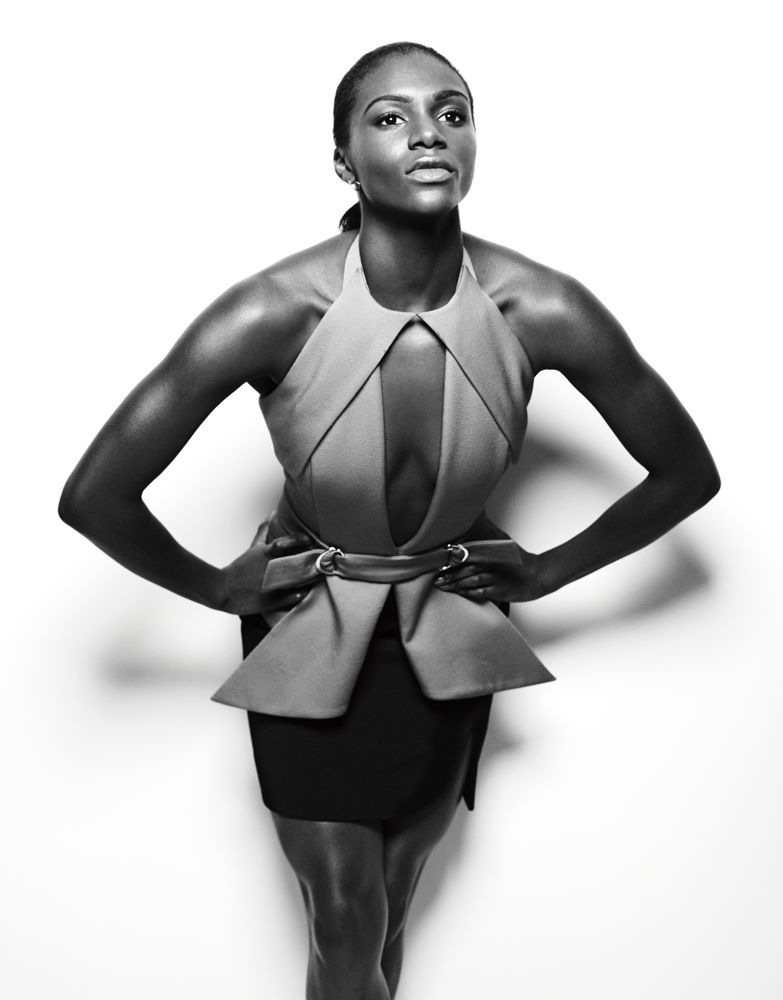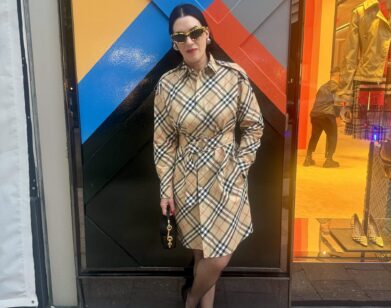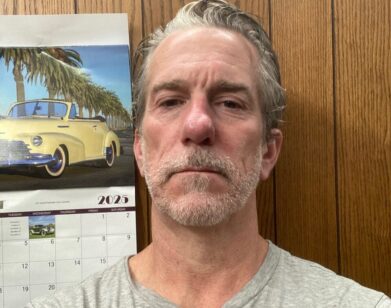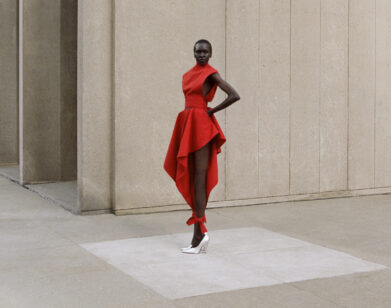The Olympic Hopeful: Team GB
DINA ASHER-SMITH IN LONDON, NOVEMBER 2015. PHOTOS: MATT HOLYOAK/KAYTE ELLIS AGENCY. STYLING: FANNIE AKERBLOM. HAIR: ADELE SANDERSON USING ORIBE HAIR CARE. MAKEUP: BEA SWEET/LMC WORLDWIDE. RETOUCHING: THE SHOEMAKER’S ELVES.
Dina Asher-Smith is an effervescent, sharp young woman, a lover of cooking and all things Masterchef (she tells us her lasagna and carrot cake muffins are particularly brag-worthy). She recently saw The Hunger Games: Mockingjay, Part 2 with her friends (her verdict, “It’s amazing”) and she’s midway through her second year of university at King’s College London. She’s also the fastest female teenager in history.
It’s a title that she gained back in August at age 19, when she ran the 200-meter in 22.07 seconds at the World Athletics Championships in Beijing. (The previously held record of 22.10 was set by British runner Kathy Cook at the 1984 Summer Olympics in Los Angeles). And the 200-meter isn’t Asher-Smith’s only impressive time; in July, she ran the 100-meter in 10.99 seconds in London’s Olympic Stadium. While she’s composed and unassuming when speaking about her records, the joy of that race is still fresh for her. “I was smiling for weeks,” she tells us over the phone. “I’m still smiling now.” Only a year prior, she ran the 100-meter for the first time internationally with a time of 11.23 seconds, which made her World Junior Champion. Within the space of a year, she shaved 0.24 seconds off her time.
While it may not be evident through her consistently impressive times, in speaking with Asher-Smith, it’s readily apparent that running isn’t her sole focus; academics are of equal import. Statements like, “I really, really like studying,” tumble out of her without a hint of cynicism or irony. That doesn’t mean striking a school/training balance is simple, though. Her mornings and days consist of classes and time spent at the library, while her evenings are spent on the track.
“It’s quite a long day every day, nine until nine, technically, but it’s still loads and loads of fun,” she assures us. “It just takes a lot of organization and planning, making sure I have enough time to get all of my essays done to the standard that I want because I’ve got to train at the same time, I can’t miss training. But I enjoy both of them, so it wouldn’t really be the same without either.”
Although she’s already been tapped as an Olympic contender by the Olympic Podium Programme, a UK Athletics program that funds athletes believed to have a chance at medalling in upcoming Olympic games, qualifying races for Rio 2016 won’t take place until June and July. If she does runs for Team Great Britain, it’s up in the air whether she’d run the 100-meter, the 200-meter, or both. “It depends what’s happening with my body and depends what’s happening with the rest of the competition in [Great Britain],” she explains. “Doubling up would be fun, but at the same time if what’s best for me or what’s available means doing one event then I’m definitely not going to mind.”
NAME: Dina Asher-Smith
AGE: 20
HOMETOWN: Orpington, England
CURRENT LOCATION: London, England at King’s College London
START AT RUNNING: I started properly running when I was about 13, but before that I did it a little bit for fun or with my friends since I was about eight years old, so in primary school. To be fair, I only really started taking it seriously when I was about 17. By then I was already represented in [Great Briain] but up until then I just thought, “Oh, this is handy. It will help me get into university. I can put it on the entry form to go to uni.” I didn’t really see it as a career path. It was only after I got a medal at the World Championships in 2013, age 17, that I thought, “I should probably take this a bit more seriously.” [laughs] Up until then it was just loads and loads of fun. Yeah, I was at GB international level, but I was still just having fun with it.
ATHLETICS IN THE FAMILY: My mum used to play hockey. She played until she was like, 30, so I guess you could say that I come from an athletic family. My dad was born in Jamaica and track and field is their national sport, but nobody did it professionally or anything.
MAJORING IN HISTORY: I’ve always been interested in history. Since I was younger, I’ve always been wondering about Henry VIII and the more normal stuff that you learn about the British Empire and things like that. As I started to get to the end of school and do A-levels—I don’t know what that is in American schools, but it’s the last two years of school here—you start to learn a different side of history where it’s a bit more about debating and which view is right, because there are so many views on one event that you think is fixed and factual when really it’s not. I thought that was really interesting and that made me want to go and study history at uni.
Right now, it’s quite funny, I’m really liking my Making Americans module, where we do your whole history. [laughs] Basically, the whole history of America through today—so the 1400s and colonization to Obama. That module is really interesting; we study all the themes and the trends. I also like the History of Western Political Ideas, so Plato, Aristotle, and people like that.
THE RIGHT HEADSPACE: I don’t really have a ritual [before sprinting], but I definitely listen to music. I warm up for about an hour or hour and a half anyway just to get ready for the race, but in terms of getting into the right headspace I do listen to music to separate myself from all the business happening behind the race and just visualize what I’m about to do; I visualize my race, visualize all the technical phases I have to go through, and then try to apply it when I run.
I listen to a lot Beyoncé and Jay Z before I race. If I’m a bit nervous and my heart rate is a bit fast I listen to The Weeknd maybe to calm myself down or Adele. But normally it’s loads of hip-hop and R&B to get myself pumped up.
I don’t really think about times when I go into a race, I think about the way that I’m going to run it. I feel like if you focus on time, you’ll always end up going slower because you run your race thinking, “Oh, I’ve got to run faster, I’ve got to run faster.” Really, what you should be thinking is, “I should be starting better, I should get out more powerfully, I should make sure that my legs are turning over well, that my legs are going quicker,” which obviously all adds up to running faster. I try to concentrate on the technical elements of my race before I think about what the outcome is. And obviously, I try to stay up front. [laughs] That as well—trying to win.
THE 100-METER VS. THE 200-METER: I think I like the 100 [more] because it’s a bit shorter. [laughs] It’s really tiring to do 200 meters. But in terms of the records, the 200-meter record was really special for me because I didn’t expect to break it, and I don’t think many people expected it to be broken for a very, very long time. I think it was a shock for everybody including myself and that’s something I’m quite proud of.
The 200 is a lot of strength work because you’ve really got to make sure that you can hold your speed for a long period of time even when your legs are screaming at you and telling you to stop running. It’s lots and lots of practicing and making sure you have lower ab strength, lower core strength to keep your legs up when you’re really, really tired and making sure you can hold your speed over a long distance. The 100 meters you really have to get each element of your race right, particularly from the start, because with it being so short you have to make sure every bit is perfect. The 100 meters is very technical, the 200 is technical as well, but you’ve got to have a bit of endurance in there.
A HAPPY SETBACK: Last year, in 2014, I tore my hamstring twice in the space of a few months, which wasn’t ideal but at the same I’m kind of grateful that I did it. It enabled me to reset with my hamstrings and restrengthen them. I feel like that really helped my season this year.
THE SENSATION OF SPRINTING: I feel like time kind of slows down, which might sound a bit odd, but you have so many different things to think about or things you can think about. When they ask you after the race, “What were you thinking about during the race?” you wonder, “How did I fit all of these thoughts into 22 seconds or 11 seconds?” And you can hear everything. When you’re racing you can hear the crowd, you can definitely feel the crowd, you can hear the footsteps and breaths of the other people in the race. I think you become quite sensitive when you’re racing.
BEING THE FASTEST FEMALE TEENAGER IN HISTORY: I don’t think it adds pressure but I don’t think it drives me further, either. It’s one of those things that’s really cool but you’ve still got so much work to do. Being the fastest teenager is really good but if you want to get medals on the wider Olympic stage you have to run faster than that..
SETTING THE 200-METER RECORD BUT LOSING THE RACE: I was watching the race obviously from where I was, which was in the middle, and I was thinking, “Dina, are you running really, really slow? What on Earth is happening? I thought you were in good shape!” I was running, thinking, “This race isn’t going too well.” When I crossed the line and saw the times that the girls winning were running I thought, “You know what? Don’t be so down because you could’ve run a [personal best],” and it turns out that I did. It was an absolutely amazing experience but at the time I was thinking, “Oh my word, what is happening?” It was so fast. I definitely wouldn’t change it for the world; it was an absolutely amazing experience to be in a race of that caliber. It’s experience for next year and the World Championships after that.
OLYMPIC ASPIRATIONS: It’s definitely been a dream of mine since I was really, really young. I remember watching the Olympics in Athens in 2004 and thinking, “That is so cool. I’d really like to do that.” I didn’t really mind which sport it was. [laughs] I just wanted to be there, full stop. Being an Olympian has definitely been a dream of mine and I’d really like to become one this year or next year.
POST-RUNNING PLANS: I’ve always been quite interested in law, like commercial law, companies, and stuff like that. That would be cool. I’ve always wanted to be a lawyer and you can transfer quite easily from history to law. So I’ve got that option but now I don’t really know, just like a normal student doesn’t really know what they want to do with the rest of their life. [laughs]
For more from our 16 Faces of 2016, click here.







